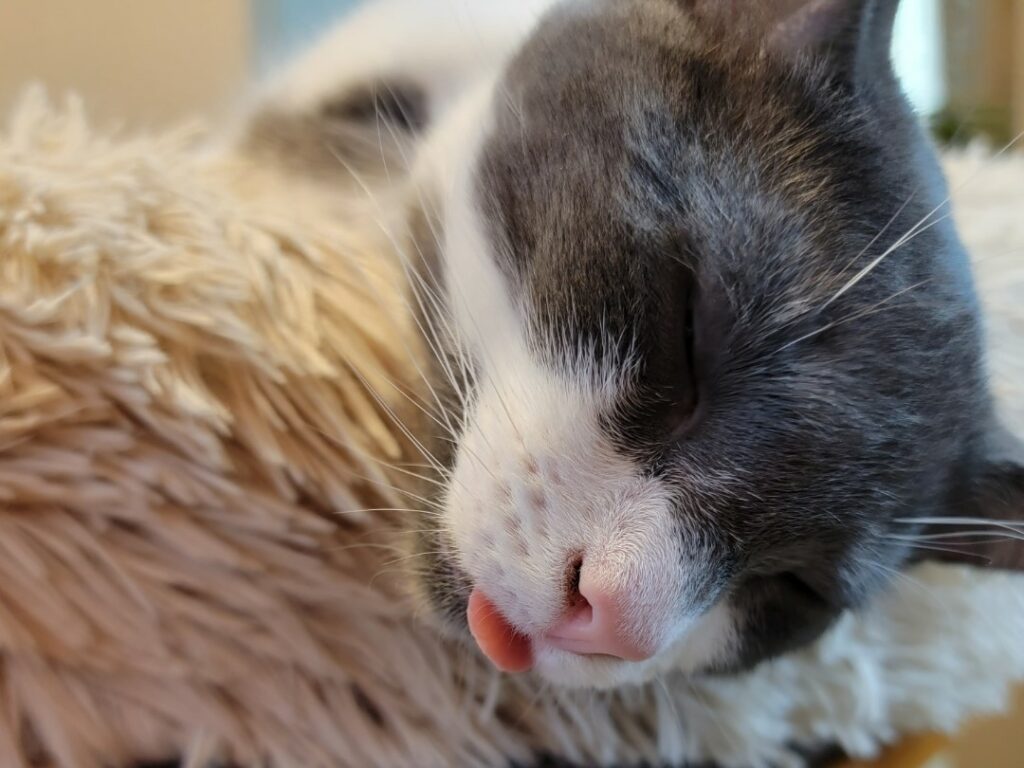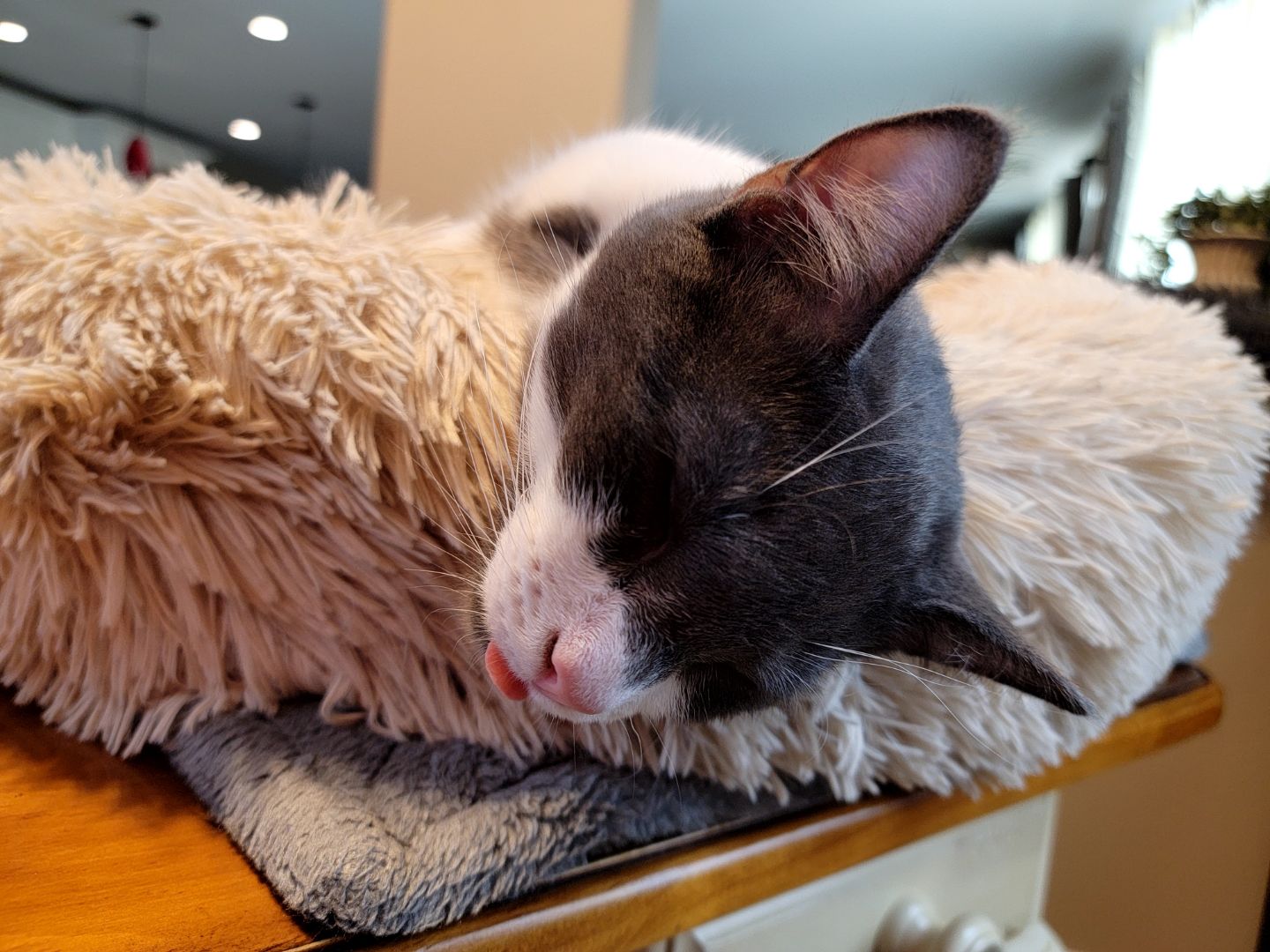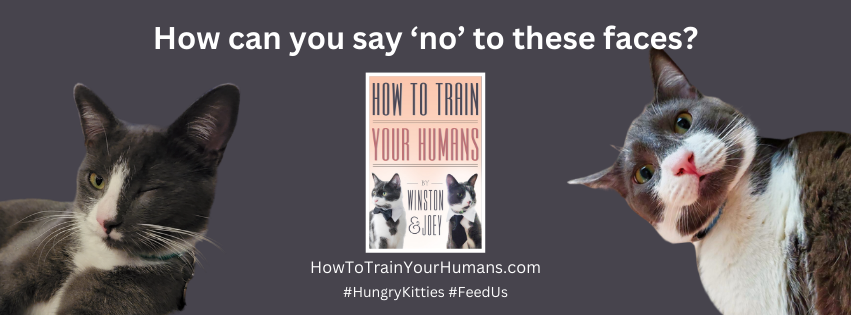You look over at your snoozing kitten and spot the tiniest pink tongue sticking out between their lips. It is ridiculously cute. But also kind of strange. Should it be doing that?
Good news: when a kitten sleeps with their tongue out, otherwise known as “blepping” to us cat folk, it is usually nothing to worry about. In fact, it is a pretty common and harmless behavior in cats. Sometimes it is a sign of total relaxation, sometimes it is just a leftover grooming moment, and sometimes it is a sign you should take a closer look.
Let’s explore the reasons behind this odd little habit, how to tell if it is normal, and what to do if it starts happening all the time.
Total Relaxation Mode
The most common reason your kitten’s tongue is sticking out during a nap is pure relaxation. Cats carry a lot of muscle tension when they are awake. Their mouths are usually closed and alert. But when they fall into a deep sleep, their jaw muscles completely relax.
That relaxed jaw can let the tongue slide forward slightly, especially if they were mid-groom or if they sleep on their side or back. Think of it like your own mouth falling open when you nap in a weird position. For kittens, that tongue just happens to come along for the ride.
This kind of tongue flop is cute, harmless, and totally normal. It is also a great sign that your kitten feels safe and comfortable in their environment.
Mid-Groom Pause
Kittens groom themselves constantly. It is their way of staying clean, regulating body temperature, and managing stress. Sometimes they fall asleep mid-groom and forget to retract the tongue.
If you catch your kitten dozing off with a paw halfway to their mouth and their tongue still out, they likely just hit pause on grooming and never hit resume. This is another harmless reason and part of normal kitten behavior.
Missing or Developing Teeth
If your kitten is very young or going through a teething phase, their mouth may feel different than usual. Kittens start losing their baby teeth around three to four months of age and grow adult teeth by six months.
Gaps in their mouth or sore gums can make it easier for the tongue to slide out or rest in awkward positions. If this is the case, you might see their tongue out more often, especially while they are sleeping.
Related read: What Your Cat Is Really Saying When They Arch Their Back.
As long as your kitten is eating normally, not drooling excessively, and not showing signs of pain, this is just part of growing up.
Flat-Faced Breeds and Tongue Shape
Some cat breeds, like Persians and Exotic Shorthairs, have flatter faces and smaller jaws. These structural differences can make it harder for them to keep their tongue completely tucked in, especially during deep sleep.
Other cats may have slightly longer tongues or naturally smaller mouths. These little quirks are usually genetic and not a cause for concern unless other symptoms appear.
If your kitten belongs to a breed known for unique facial features, their tongue-out moments may just be part of the package.
When to Take a Closer Look
While the occasional tongue-out nap is nothing to worry about, there are times when it could signal a medical issue. If the behavior becomes frequent, lasts beyond sleep, or comes with other symptoms, it might be time to investigate.
Keep an eye out for:
- Excessive drooling
- Bad breath
- Difficulty eating or chewing
- Pawing at the mouth
- Swelling around the jaw or face
- Tongue discoloration or sores
These could indicate dental problems, oral injuries, or other health concerns that need attention. If your kitten’s tongue is always out and they seem uncomfortable or off their game, a quick vet visit is the safest call.

I love feeling the breeze on my tongue while I catch some z’s. Besides, it’s my signature move! I mean, how else am I supposed to stay cool and show off my adorable smile at the same time? Plus, it drives all the girl kitties wild, if you know what I mean! #TongueOutTuesday #KittyNaps #TooCuteForWords #TrollingForGirlKitties
Joey
What to Do If You Notice It Often
If your kitten regularly sleeps with their tongue out but seems otherwise healthy and happy, there is no need to intervene. It is just one of those quirks that makes them extra adorable.
But if it is new, sudden, or paired with any changes in appetite or behavior, take note of when and how often it happens. Make sure your kitten’s mouth looks clean and check that they are eating, drinking, and playing normally.
You can also gently lift their lip while they sleep to peek at their gums and teeth. Look for signs of redness, swelling, or anything that seems off. If something looks unusual, your vet can do a full exam and let you know if treatment is needed.
Final Thoughts: A Sleepy Tongue Is Usually Just a Silly Habit
When your kitten sticks their tongue out while sleeping, it is almost always a sign that they feel relaxed, safe, and comfortable in their space. Whether they are fresh off a grooming session or just napping in full loaf mode, that little pink tongue is more charming than concerning.
Still, it is good to know the signs that separate normal behavior from a potential health issue. If your kitten shows no other symptoms and seems happy, just enjoy the cuteness and maybe take a few pictures for the album.
If they start doing it all the time, stay observant and don’t hesitate to ask your vet if anything seems off. After all, when it comes to cat health, trust and curiosity should go hand in hand.
Recent Posts
Explore why cats sleep so much, including the evolutionary reasons and the health benefits they derive from their extensive sleep patterns.
Explore the causes of cat dandruff, its implications, and effective ways to deal with it so your feline friend remains happy and healthy.


